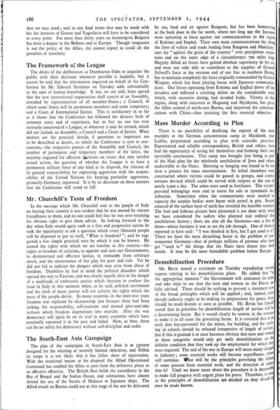Mr. Churchill's Tests of Freedom
In the message which Mr. Churchill sent to the people of Italy on leaving their country it was evident that he was moved by sincere friendliness to them, and no one could feel that he was over-straining his obvious right to give them advice. In looking forward to the day when Italy would again rank as a free and progressive nation he took the opportunity to ask a question which every liberated people will be disposed to put to itself, " What is freedom? "; and he sug- gested a few simple practical tests by which it can be known. He named the rights with which we are familiar in this country—the rights to freedom of criticism, to appoint and turn out Governments, to disinterested and effective justice, to immunity from arbitrary arrest, and the maintenance of fair play for poor and rich. Yet he did not fail to indicate the dangers which may arise from abuse of freedom. Doubtless he had in mind the political disorders which opened the way to Fascism, and was clearly equally alive to the danger of a multitude of embryonic parties which threaten to confuse the issue in Italy at this moment when, as he said, political excitement and the clash of many parties will not achieve the rights which the mass of the people desire. In many countries in the inter-war years freedom was replaced by dictatorship just because there had been lacking the responsibility, self-restraint and mutual give-and-take without which freedom degenerates into anarchy. After the war democracy will again be on its trial in many countries which have nominally espoused it in the past and failed. Now, as then, there can be no safety for democracy without self-discipline and order.


























 Previous page
Previous page